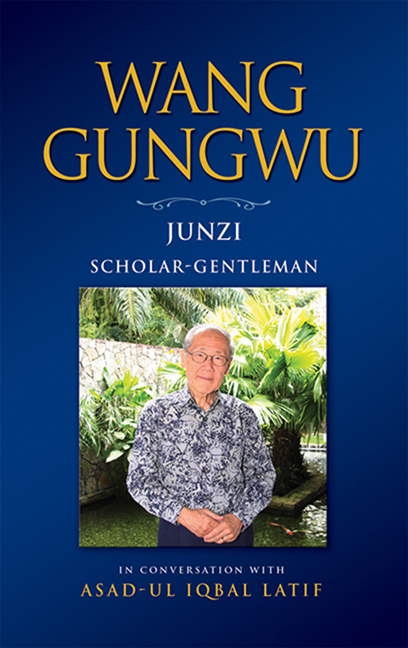Book contents
- Frontmatter
- Contents
- Foreword
- Wang Gungwu: Friend, Mentor and Role Model
- Junzi: Scholar-Gentleman
- INTERVIEWS WITH PROFESSOR WANG GUNGWU
- Being Chinese in Malaya
- Malaysia, Singapore and Australia
- Vietnam
- Hong Kong
- China Rising
- Taiwan, Japan and India
- The United States, Terrorism and War
- Half a Century of Marriage: An Interview with Mrs Margaret Wang
- Appendices
- Index
- Plate Section
Being Chinese in Malaya
from INTERVIEWS WITH PROFESSOR WANG GUNGWU
Published online by Cambridge University Press: 09 November 2017
- Frontmatter
- Contents
- Foreword
- Wang Gungwu: Friend, Mentor and Role Model
- Junzi: Scholar-Gentleman
- INTERVIEWS WITH PROFESSOR WANG GUNGWU
- Being Chinese in Malaya
- Malaysia, Singapore and Australia
- Vietnam
- Hong Kong
- China Rising
- Taiwan, Japan and India
- The United States, Terrorism and War
- Half a Century of Marriage: An Interview with Mrs Margaret Wang
- Appendices
- Index
- Plate Section
Summary
Your father came from Taizhou to teach Chinese in Malaya. What drew him here?
My parents came from well-established families in China that had been impoverished over a generation or two. Most Chinese had been impoverished by changing political conditions, the changeover of systems of government, the civil war, the complete collapse of the economy basically from the changes that took place when an agrarian economy found itself threatened by capitalist forces. That was so in the rest of Asia as well. With the rise of the new capitalism, of new manufacturing industries arising from the Industrial Revolution of the West, many of the local industries were killed off. And certainly in rural China, what was happening from the middle of the 19th century was the steady impoverishment of people who were producing things that they couldn't sell any more. Or, they would sell them for such a low price that they couldn't survive. However, the Chinese themselves were trying to catch up, building their own industries and so on, manufacturing cheap things, and this of course had an impact on rural industry. So that period of adaptation was, I think, perilous for families everywhere in Asia.
In that sense, my parents were not exceptional. My father actually was relatively fortunate. He had a good education at home because he came from an educated family. He got to a teachers’ college that merged with the university so he was both in education and had a university education. So he had a degree — but the degree wasn't worth much. In those days, you graduated and there weren't any jobs; it's becoming like that again. The family wasn't able to help him and, so, the moment he graduated, he looked for a job. That meant a school-teaching job in those days unless you were exceptionally fortunate and received a scholarship to go to the United States. So he started out as a teacher in China and was then offered a job to come out to Southeast Asia and teach at a better salary. It was a good cause as well. The cause was to educate the overseas Chinese. It was a cause that the government actually officially endorsed. It encouraged young people to go out and teach abroad.
- Type
- Chapter
- Information
- Wang GungwuJunzi: Scholar-Gentleman in Conversation with Asad-ul Iqbal Latif, pp. 11 - 25Publisher: ISEAS–Yusof Ishak InstitutePrint publication year: 2010



